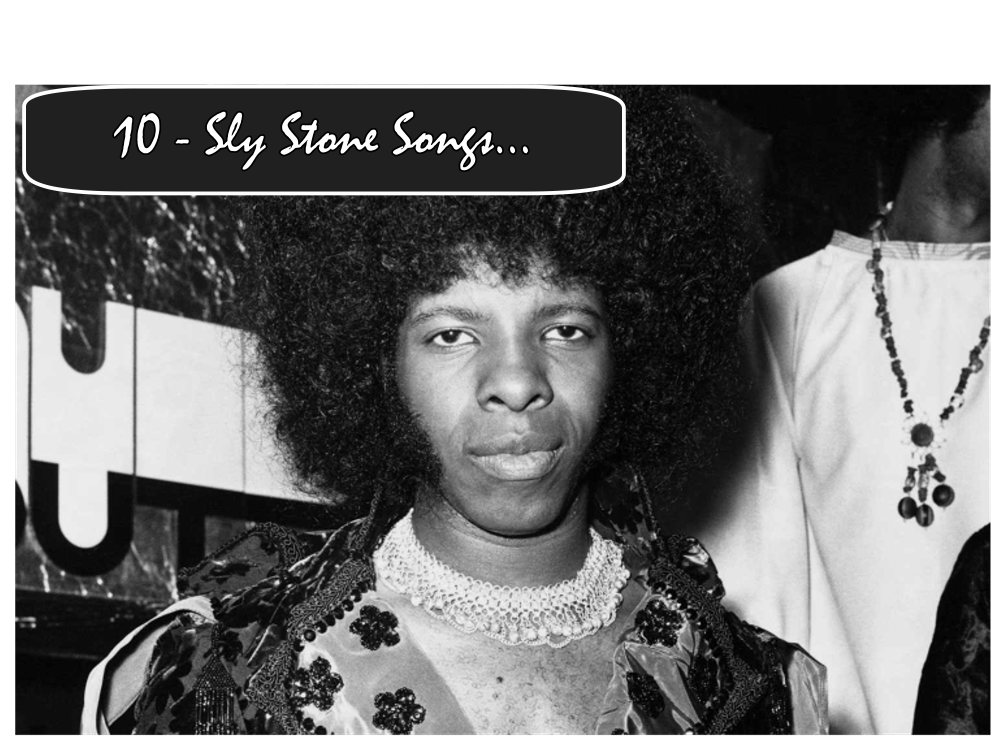(ThyBlackMan.com) Sly Stone didn’t just create music—he built a whole universe out of rhythm, rebellion, and radical honesty. His songs shook up the airwaves, fused genres, and broke every rule while inviting everyone to the party. Funk, soul, rock, gospel—Sly stirred them all together and turned the result into something electric.
Listening to these tracks today feels less like nostalgia and more like rediscovery. The grooves still hit hard. The messages still challenge. And the vibe? Still unmatched. These ten songs aren’t just a playlist—they’re snapshots of a visionary laying it all out, flaws and fire included.

1. “Thank You (Falettinme Be Mice Elf Agin)”
This track is arguably the ultimate Sly Stone anthem—a funky, bass-driven declaration of personal freedom, identity, and rebellion. From the warped spelling of the title to the gritty slap-bass line laid down by Larry Graham, this song is raw, untamed energy captured in wax. It’s funky not just in style but in spirit, unapologetically bold and ahead of its time.
The lyrical phrasing in “Thank You” is deceptively simple, yet powerfully subversive. Stone addresses conformity, fake politeness, and social pressure with sly digs like “Dance to the music, all night long / Everyday people, sing a simple song.” These aren’t just nods to earlier hits—they’re critiques, delivered with that unmistakable Sly sarcasm. It’s as if he’s burning down the house he built, demanding evolution over repetition.
Musically, the song is a masterclass in restraint and eruption. The rhythm section, especially the bass and drums, creates a dirty, rolling groove that drives the whole composition. Sly’s vocal delivery shifts between cool swagger and fervent cry, and the background vocals from the Family Stone add to the feeling that this was a movement—not just a band. The rawness of the production—those almost lo-fi textures—gives the song a livewire pulse that refuses to fade.
Even today, “Thank You” hits with a thunderous freshness. It’s sampled by countless artists, from Janet Jackson to A Tribe Called Quest, and its influence continues to ripple across genres. The message still matters, and the groove still kills. It’s not just one of the best funk songs of all time—it’s one of the most fearless.
2. “If You Want Me to Stay”
A smooth, sultry standout from Fresh, this song finds Sly in a deeply introspective mode. Gone is the anthemic call-to-arms of earlier tracks—in its place is a plea, a warning, and a confession wrapped in mellow funk. With its seductive bass line and Sly’s restrained vocal performance, the song feels intimate, almost whispered into the ear of a lover.
Lyrically, it’s Sly Stone pulling back the curtain a bit. “If you want me to stay, I’ll be around today,” he croons, but the undercurrent of doubt is palpable. There’s vulnerability here that you don’t often get in funk. It’s emotional maturity coated in groove, a man who’s been burned too many times letting you know this love has terms and conditions. The pain isn’t loud—it simmers quietly underneath, making it even more poignant.
The arrangement is minimal, but deliberate. The guitar riffs are clipped and sharp, the keys provide a gentle wash of color, and the horns punctuate the groove just enough. It’s that minimalism that gives the track its intimacy and staying power—there’s space for the listener to feel. That negative space is as important as what’s played, making each note land with added weight.
Today, “If You Want Me to Stay” remains a go-to track for breakup playlists and late-night introspection. It’s been sampled, remixed, and covered—from Red Hot Chili Peppers to Erykah Badu—but the original stands strong, proof that funk can be as personal and emotionally complex as any ballad. It’s a blueprint for what vulnerability sounds like when you let the rhythm do the talking.
3. “Dance to the Music”
This is the song that launched Sly and the Family Stone into mainstream consciousness, and it’s easy to see why. “Dance to the Music” is a celebration of rhythm and inclusion—funk’s open invitation to the world. From the opening command to “get on up and dance,” the track builds an unstoppable momentum. It’s not just a party starter—it’s a mission statement.
Every member of the band gets a moment to shine. The callouts—“Cynthia on the trumpet!”—aren’t just gimmicks, they’re communal. The song becomes a live jam session that pulls the listener in, breaking the fourth wall of music-making. It’s joyous, electric, and unifying in the best sense of the word. It announces that this band isn’t just about one man—it’s about shared brilliance.
Instrumentally, this song is all about synergy. The guitar is crunchy, the keys are bright, and the horns stab through the mix with purpose. It’s impossible to stay still when this one comes on. And yet, beneath the party atmosphere, there’s a quiet genius in the structure—this is organized chaos executed with precision. It’s the musical equivalent of a live wire—sparking and spontaneous.
In today’s hyper-digitized music world, “Dance to the Music” is a reminder of funk’s analog magic. No tricks, no overdubs—just pure groove and talent. It’s the kind of track that still gets dance floors moving and generations bridging gaps. Put it on at a wedding, block party, or backyard barbecue—it’s timeless, joyful, and deeply human.
4. “Everyday People”
A song that became the peaceful protest anthem of a generation, “Everyday People” is one of Sly Stone’s most potent statements. Its famous line, “I am no better and neither are you,” cut through the racial, social, and political noise of the 1960s with clarity and grace. It didn’t shout—it reasoned. And sometimes, that’s more powerful.
Musically, it’s far gentler than Sly’s other tracks. There’s a simplicity in the melody and structure that mirrors the simplicity of its message: unity through diversity. The harmonies are clean and optimistic, the piano and bass dance together, and the drums keep everything soft and steady. This wasn’t meant to rile you up—it was meant to let you breathe and think.
The brilliance lies in the lyrical directness. Lines like “different strokes for different folks” entered the cultural lexicon for a reason—they’re clear, relatable, and disarming. There’s no grandstanding, just heartfelt truth spoken in a way anyone can absorb. It’s the sound of empathy set to music, wrapped in a melody you can hum on your walk to work.
This song remains relevant in 2025 because the issues it addressed haven’t disappeared. “Everyday People” feels like both a time capsule and a mirror. Play it in classrooms, protests, or family gatherings—it still resonates. It’s a gentle challenge to be better, to listen more, and to recognize the humanity in the person next to you, no matter how different they might seem.
5. “Family Affair”
From the landmark There’s a Riot Goin’ On album, “Family Affair” is raw, murky, and somber. A far cry from the band’s earlier joyful energy, this track finds Sly in the midst of paranoia and fatigue. But from that place of darkness, he created a masterpiece of emotional complexity. It’s less about performance and more about presence—a quiet, foggy reckoning with kinship and trauma.
The drum machine—unusual at the time—gives the song a mechanical, almost robotic feel. It’s like a heartbeat drained of emotion, which works hauntingly well. Sly’s voice is low, mumbled, intimate. He’s not projecting to a crowd—he’s whispering to himself. The sparseness of the arrangement forces you to lean in, to absorb the pain in his phrasing. Billy Preston’s electric piano adds just enough sparkle to keep the song from sinking completely into despair.
The lyrics speak of disconnection, resentment, and the ambiguity of family love. “One child grows up to be somebody who just loves to learn, and another child grows up to be somebody you’d just love to burn.” That line alone stops you cold. It’s a brutally honest take on the complexities of family dynamics—rare in any genre, especially funk. And it’s delivered without melodrama. That makes it land even harder.
Even today, “Family Affair” feels like a precursor to the more introspective R&B and soul that would follow in the 1990s and 2000s. Artists like D’Angelo, Maxwell, and Frank Ocean owe a debt to this brand of vulnerable funk. It’s a reminder that groove can still ache—and that sometimes the truth doesn’t need to shout to be heard.
6. “I Want to Take You Higher”
A pure adrenaline shot of funk-rock, “I Want to Take You Higher” is a song that does exactly what it claims—it elevates. Originally a B-side to “Stand!”, this track took on a life of its own, especially after the group’s electric performance at Woodstock. It’s raucous, euphoric, and bursting with kinetic energy. Funk rarely sounded this gloriously unhinged.
The groove is relentless. From the opening “Boom shaka-laka-laka,” the track rolls like a steam engine. The horns scream, the guitar churns, and Sly’s vocals punch through with command. It’s impossible to resist. The song dares you to keep up. That hook—repeating “higher!” with layered vocals and tribal fervor—works like a mantra, pushing the intensity further with each bar.
Lyrically, it’s not deep—but it doesn’t need to be. It’s about surrendering to the music, to the rhythm, to the possibility of joy. There’s something primal in its simplicity. It’s music as movement, spirit as sound. And the interplay between Sly, Rose Stone, and Larry Graham on vocals makes it feel like a shared outburst of joy.
Today, it stands tall as one of funk’s purest high-octane moments. Throw it on at any party or workout and feel your energy instantly spike. It’s a classic not because it’s complex, but because it delivers exactly what it promises—elevation through rhythm. This is what funk sounds like when the roof comes off.
7. “Stand!”
This track might be Sly Stone’s greatest motivational statement. “Stand!” is both a rallying cry and a musical sermon, urging listeners to rise up, speak truth, and hold their ground in the face of injustice. And it does all of that while sounding like a funky parade. It’s not just a call to arms—it’s a call to spirit.
The instrumentation is full-bodied. The organ swells, the drums march with purpose, and the horns explode like fireworks. Sly’s vocals are confident, the chorus is empowering, and the whole band sounds like it’s marching into battle—with joy as their weapon. There’s something in the tempo and punch of the chorus that makes you want to square your shoulders and face the world.
What’s striking about “Stand!” is its ability to uplift without sounding corny. The lyrics are bold but not didactic. They urge action, but they also honor individuality: “Stand! For the things you know are right.” The shift in tempo mid-song, where the band breaks into a nearly psychedelic jam, adds emotional heft. It’s like the music itself is standing up and pushing forward, asking you to hold the line with it.
Fifty years later, this song still works as a motivational anthem. Whether you’re facing injustice or just trying to get through the day, “Stand!” reminds you that music can be a backbone—and Sly gave us a strong one. It’s funk’s version of a soul sermon—equal parts rhythm, rebellion, and reverence.
8. “Hot Fun in the Summertime”
This is Sly at his most laid-back and nostalgic. Released shortly after their Woodstock triumph, “Hot Fun in the Summertime” is a sun-drenched slow jam that captures the carefree feeling of long days, love, and warm weather. It’s both a celebration and a subtle goodbye to innocence, wrapped in glowing harmonies and bittersweet optimism.
The melody is lush, almost doo-wop influenced, and the vocals are smooth and harmonized. It’s not trying to be loud or political—just sweet. The strings in the background elevate it from a simple tune to something almost cinematic. You can practically feel the sun hitting your face as you listen, the haze of childhood memories drifting through the notes.
Lyrically, it’s all about memories—school letting out, hanging with friends, sneaking a kiss. But there’s a touch of sadness too, as if Sly knows those moments are fleeting. There’s an underlying wistfulness, a subtle sense that these perfect days are precious precisely because they won’t last forever. That duality—joy tinged with melancholy—is what gives the song its staying power.
“Hot Fun in the Summertime” still belongs on every summer playlist. It’s the kind of song you play during golden hour, windows down, heart open. That feeling never goes out of style. It’s nostalgia without weight, warmth without expectation—just the fleeting bliss of a season you wish would never end.
9. “You Can Make It If You Try”
Tucked within Stand! is this uplifting gem. “You Can Make It If You Try” fuses gospel, funk, and soul into a message of encouragement. It’s classic Sly—motivational but grounded in groove. Rather than sounding preachy or overproduced, it feels like a friend pulling you aside and telling you, “Don’t give up—you got this.”
The rhythm section is tight, the horns are crisp, and Sly’s vocals lead the way like a preacher. It’s got church energy, but it’s not preaching religion—it’s preaching belief in yourself. The repetition of the title is more than a chorus—it’s a mantra. Sly isn’t just throwing out feel-good slogans; he’s reinforcing a mental habit. Each chant becomes a step up the mountain.
There’s a beautiful tension in the song: the music is celebratory, but the lyrics hint at the grind of perseverance. “Try a little harder, that simply means you got to do it again.” That line tells the whole story—success isn’t about talent or luck, it’s about grit. Coming from Sly, a man who battled both racism and addiction while redefining pop music, those words hit differently. He earned them.
Even in today’s era of self-help culture, this song feels genuine. It’s not a gimmick—it’s gospel for the underdog. Whether you’re hustling through college, battling illness, facing systemic odds, or just trying to make it through Monday, this song has your back. It’s a track that doesn’t just uplift—it walks with you.
10. “Sing a Simple Song”
A funk-rock explosion, “Sing a Simple Song” is anything but simple. This track is a masterclass in syncopation, rhythm layering, and vocal interplay. It’s raw, raucous, and full of attitude. It’s also one of Sly & The Family Stone’s most technically brilliant compositions, even though it presents itself like a casual jam session that just caught fire.
The song starts with a shout and never lets up. The drums are loose yet focused, the guitars are jagged, and the vocals are shared among the band in a thrilling call-and-response format. It’s communal chaos—and it works perfectly. That constant back-and-forth of voices feels like a musical food fight where everybody’s in on the fun. Nobody’s left on the sidelines.
The irony, of course, is in the title. The song itself is complex and unpredictable. But maybe that’s the point: life isn’t simple, but music can help you navigate it. “Sometimes I’m right, then I can be wrong,” they sing—a nod to Everyday People but also a deeper truth about embracing contradictions. It’s therapeutic chaos, grounded in groove. The message is: sing through it, even when it’s messy.
Today, “Sing a Simple Song” still excites musicians and fans alike. It’s been sampled by countless hip-hop artists—most famously in songs by Public Enemy, Digital Underground, and 2Pac—and remains a favorite for live jam sessions. It’s a messy, brilliant masterpiece—and a final reminder that Sly Stone didn’t just play funk. He deconstructed it, rebuilt it, and made it bleed with life. You don’t just hear this one—you feel it in your bones.
Revisiting Sly Stone’s work isn’t just about soaking in the funk—it’s about remembering how much soul, grit, and innovation went into every single note. These songs weren’t polished for perfection—they were honest, sometimes messy, always real. And maybe that’s why they still resonate.
In a world that often feels louder than ever, Sly reminds us to dance through the noise, to speak simply and boldly, and to find power in both joy and vulnerability. Whether you’re here for the basslines, the messages, or just to vibe, one thing’s for sure: Sly Stone still has something to say. And after all these years, we’re still listening.
Staff Writer; Jamar Jackson

















Great list, perfect order and you got the right one for #1
I am surprised Papa was a rolling Stone didn’t make the list? I never get tired of their music. I listen to this video regularly.
Com mo, Man were talking about Sly and the Family Stone music not the Temptations.